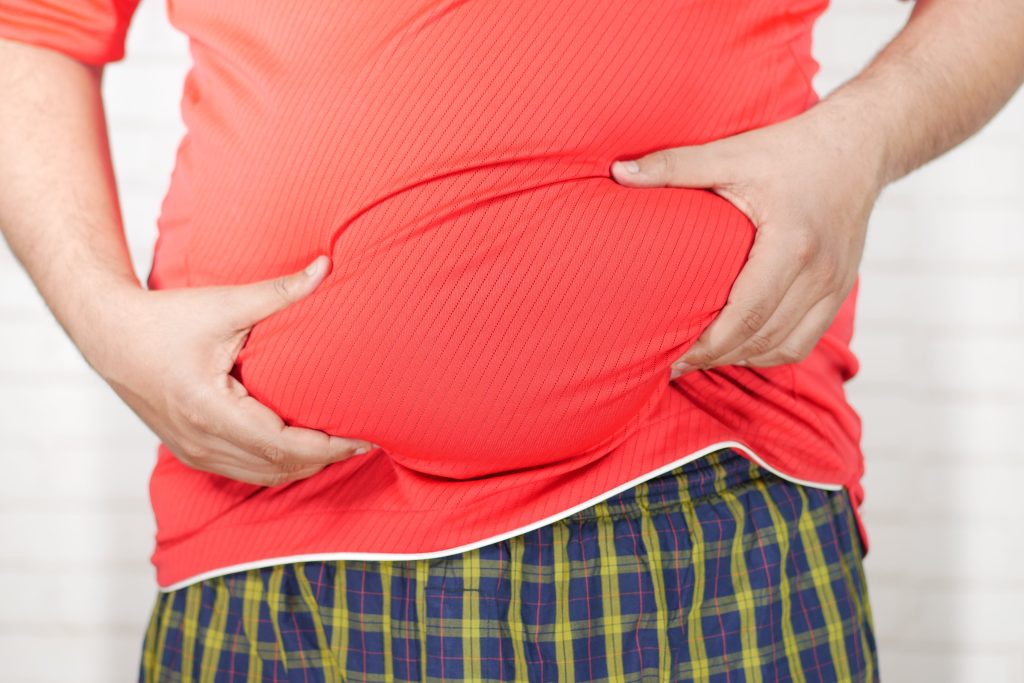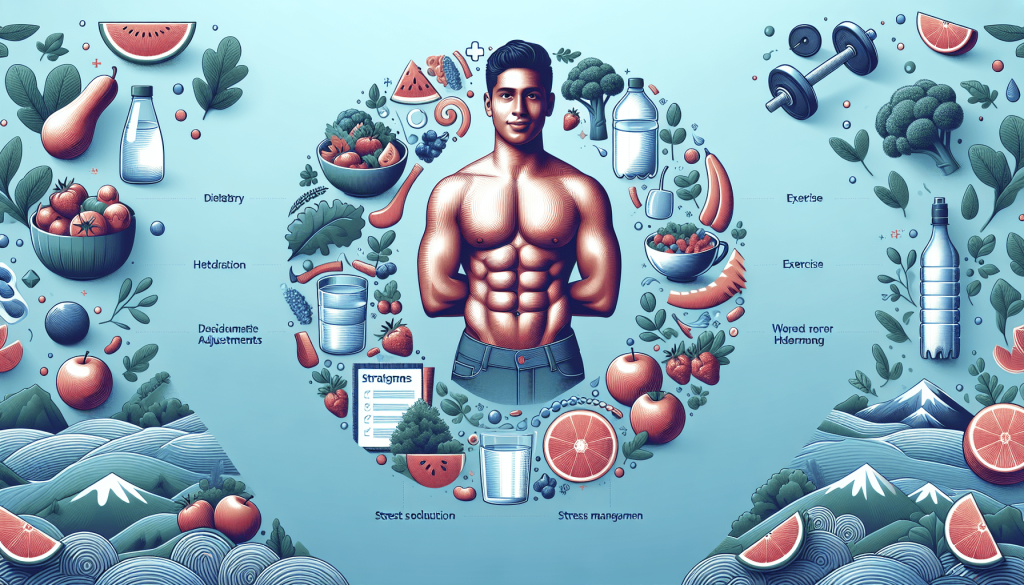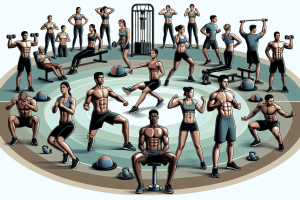If you’ve ever wondered how to reduce bloating and achieve a more defined set of abs, you’re not alone. Many people strive for strong core muscles and a toned midsection, but bloating can often get in the way of achieving that desired definition. Luckily, there are effective ways to combat bloating and improve your ab definition. In this article, we’ll explore some helpful strategies to reduce bloating and enhance the appearance of your abs, so you can feel confident and proud of your hard work.
Importance of Reducing Bloating
Enhances Ab Definition
When it comes to achieving that chiseled, ripped appearance, reducing bloating is key. Bloating can hide your hard-earned abdominal muscles and make them less visible. By reducing bloating, you enhance your ab definition and allow all your hard work to shine through. So, if you’re aiming for a defined six-pack, reducing bloating should be at the top of your priority list.
Improves Overall Appearance
Reducing bloating not only enhances your ab definition but also improves your overall appearance. Bloating can make you look and feel heavier than you actually are, which can be frustrating and affect your self-esteem. By reducing bloating, you can achieve a leaner and more toned physique, making you feel more confident and happier in your own skin.
Boosts Confidence
Excess bloating can often lead to discomfort and feelings of self-consciousness. When you’re constantly bloated, it’s natural to feel less confident and avoid certain activities or social situations. By actively working on reducing bloating, you can boost your confidence levels and feel more comfortable in your body. Feeling good about yourself and your appearance is essential for overall well-being and a positive mindset.
Maintain a Healthy Diet
Consume Fiber-Rich Foods
Including fiber-rich foods in your diet can significantly help reduce bloating. Fiber adds bulk to your stools, making them easier to pass and preventing constipation, a common cause of bloating. Increase your intake of fruits, vegetables, whole grains, and legumes to ensure an adequate fiber intake. Foods like broccoli, Brussels sprouts, avocados, and chia seeds are excellent sources of fiber that can aid in reducing bloating.
Limit Sodium Intake
Consuming excessive amounts of sodium can cause water retention, leading to bloating. High sodium levels can disrupt the balance of fluids in your body, causing your cells to retain more water. To reduce bloating, limit your consumption of processed and packaged foods, which are often high in sodium. Instead, opt for fresh, whole foods and season meals with herbs, spices, or lemon juice to add flavor without adding excess sodium.
Avoid Carbonated Drinks
Carbonated drinks, including soda and sparkling water, can introduce extra gas into your digestive system, leading to bloating. The bubbles in these drinks can get trapped in your stomach, causing discomfort and distention. Avoiding or minimizing your consumption of carbonated drinks can help reduce bloating and improve digestion.
Minimize Consumption of Artificial Sweeteners
Artificial sweeteners, such as sorbitol and xylitol, are commonly found in diet sodas, sugar-free candies, and some chewing gums. These sweeteners are known to cause bloating and digestive issues in some individuals. Be mindful of your intake of artificial sweeteners and consider reducing or eliminating them from your diet to reduce bloating.

Drink Plenty of Water
Stay Hydrated
Drinking plenty of water is essential for overall health and well-being, including reducing bloating. When you’re dehydrated, your body tends to retain water, which can contribute to bloating and fluid retention. By staying hydrated, you maintain the proper fluid balance in your body, preventing bloating caused by water retention.
Flushes Out Toxins
Water acts as a natural detoxifier, helping to flush out toxins from your body. When toxins build up in your system, it can lead to digestive issues, including bloating. By drinking an adequate amount of water daily, you support your body’s natural detoxification process and promote a healthy digestive system.
Prevents Water Retention
As mentioned earlier, dehydration can cause your body to retain water, leading to bloating. By regularly drinking water, you signal to your body that it doesn’t need to hold on to excess water. This can help reduce water retention and consequently reduce bloating. Aim to drink at least eight glasses of water a day to stay properly hydrated and minimize bloating.
Manage Stress Levels
Practice Stress-Relief Techniques
Believe it or not, stress can have a significant impact on your digestive system and contribute to bloating. When you’re stressed, your body releases hormones that can disrupt the normal functioning of your gut. This can lead to bloating, gas, and other digestive issues. To reduce bloating, incorporate stress-relief techniques into your daily routine, such as deep breathing exercises, meditation, yoga, or engaging in hobbies that help you relax.
Get Sufficient Sleep
Lack of sleep can disrupt your hormones and increase stress levels, which can indirectly contribute to bloating. Aim to get at least seven to eight hours of quality sleep every night to promote proper digestion and reduce bloating. Establish a relaxing bedtime routine, create a comfortable sleep environment, and prioritize sleep as an essential part of your overall health.
Engage in Physical Activities
Regular physical activity not only helps keep your body fit and healthy but also aids in reducing bloating. Exercise stimulates the natural contractions of your intestines, helping to move food through your digestive system more efficiently. This can prevent bloating and promote healthy digestion. Incorporate activities like walking, jogging, cycling, or any form of exercise you enjoy into your routine for optimal bloating reduction.

Avoid Trigger Foods
Identify Personal Trigger Foods
Everyone’s body reacts differently to certain foods, so it’s important to identify your personal trigger foods. Some common culprits that can cause bloating include beans, lentils, cabbage, onions, garlic, and certain fruits like apples and pears. Keep a food diary and pay attention to how your body reacts to different foods. By identifying and avoiding your personal trigger foods, you can significantly reduce bloating and improve your overall digestive health.
Reduce Intake of Gas-Causing Foods
Certain foods are more likely to cause gas in your digestive system, leading to bloating. Some examples include fizzy drinks, beans, lentils, broccoli, cabbage, onions, and carbonated beverages. While these foods may be healthy and nutritious, they can also cause bloating for some individuals. Experiment with reducing your intake of these gas-causing foods to see if it helps reduce bloating.
Limit Consumption of Processed Foods
Processed foods are often high in added sugars, unhealthy fats, and artificial additives, which can disrupt your digestion and cause bloating. These foods are also typically low in fiber and essential nutrients, making digestion more challenging. Aim to minimize your consumption of processed foods and opt for fresh, whole foods instead. Your digestive system will thank you, and you’ll notice a reduction in bloating.
Moderate Consumption of Dairy Products
For some individuals, dairy products can trigger bloating and digestive discomfort. This is often due to lactose intolerance, where the body has difficulty digesting lactose, the sugar found in dairy products. If you suspect that dairy may be causing your bloating, consider reducing your consumption or trying lactose-free alternatives, such as lactose-free milk or dairy-free alternatives like almond or soy milk.
Eat Smaller, Frequent Meals
Prevents Overeating
Overeating can lead to bloating as your stomach becomes stretched beyond its comfortable capacity. By eating smaller, more frequent meals throughout the day, you can prevent overeating and reduce the likelihood of bloating. Eating smaller portions allows your digestive system to handle food more efficiently, minimizing the chances of bloating and discomfort.
Improves Digestion
Eating larger meals can put a strain on your digestive system, especially if you have a naturally slower metabolism. By opting for smaller, more manageable meals, you give your digestive system a break and allow it to digest food more easily. This can lead to improved digestion, reduced bloating, and a more comfortable overall feeling after meals.
Reduces Bloating
Eating smaller, more frequent meals can have a direct impact on reducing bloating. By preventing overeating and giving your body time to digest smaller portions, you minimize the chance of excessive gas and bloating. This can help you feel lighter, more energetic, and more comfortable throughout the day.

Include Probiotics in Your Diet
Consume Yogurt or Kefir
Probiotics are live bacteria that can benefit your digestive system and promote a healthy gut. Consuming foods rich in probiotics, such as yogurt or kefir, can help regulate your digestion and reduce bloating. These foods contain beneficial bacteria that can restore the balance of your gut microbiome, leading to improved digestion and reduced bloating.
Try Probiotic Supplements
If you’re not a fan of yogurt or kefir, or if you want to further supplement your probiotic intake, consider trying probiotic supplements. These supplements come in various forms, including capsules, powders, and liquids, and can help introduce beneficial bacteria into your digestive system. Consult with a healthcare professional to find the right probiotic supplement for your needs.
Exercise Regularly
Engage in Cardiovascular Activities
Cardiovascular activities, such as running, swimming, or cycling, can help reduce bloating and promote overall health. These activities increase blood flow to your muscles and organs, including your digestive system, which can enhance digestion and reduce bloating. Aim for at least 150 minutes of moderate-intensity cardio exercises per week for optimal bloating reduction.
Incorporate Strength Training
Strength training exercises, such as weightlifting or bodyweight exercises, can help build lean muscle mass and increase your metabolism. By increasing your muscle mass, you enhance your body’s ability to burn calories and improve overall digestion. Including strength training in your fitness routine can have a positive impact on reducing bloating and achieving a more defined abdominal area.
Focus on Core-Strengthening Exercises
Specific core-strengthening exercises can target the muscles in your abdominal area and help improve their definition. Regularly performing exercises like planks, crunches, and bicycle kicks can strengthen your core muscles, enhance their visibility, and reduce bloating by promoting proper digestion. Incorporate these exercises into your fitness routine for stronger, more defined abs and reduced bloating.

Avoid Swallowing Air
Eat Slowly and Mindfully
Eating too quickly or not chewing your food thoroughly can lead to swallowing excess air, which can contribute to bloating. By eating slowly and mindfully, you allow your body to properly digest food and reduce the chance of swallowing air. Take the time to enjoy your meals, chew each bite thoroughly, and savor the flavors. Your digestive system will thank you, and you’ll notice a reduction in bloating.
Avoid Chewing Gum
Chewing gum is a common habit that can introduce excess air into your digestive system, leading to bloating. The act of chewing gum can cause you to swallow air, and some gums also contain artificial sweeteners that can further contribute to bloating. If you’re prone to bloating, it’s best to avoid chewing gum altogether or limit your consumption to prevent unnecessary air swallowing.
Limit Use of Straws
Using a straw while drinking can cause you to swallow more air than necessary, leading to bloating. When you drink through a straw, you naturally take in more air with each sip. To reduce bloating, drink directly from a glass or bottle instead of using a straw. This simple change can help minimize air intake and decrease the chances of bloating.
Seek Medical Advice
Consult a Healthcare Professional
If you’ve tried various strategies to reduce bloating but haven’t experienced significant improvement, it may be time to seek medical advice. A healthcare professional, such as a doctor or gastroenterologist, can evaluate your symptoms, rule out any underlying digestive issues, and provide appropriate guidance or treatment. They can also help identify any potential dietary triggers or recommend further tests if necessary.
Rule Out Underlying Digestive Issues
Bloating can sometimes be a symptom of an underlying digestive issue, such as irritable bowel syndrome (IBS), celiac disease, or food intolerances. If you experience persistent or severe bloating, along with other digestive symptoms, it’s important to consult a healthcare professional to rule out any underlying conditions. They can guide you through the necessary examinations and help develop a personalized plan to address your specific situation.
In conclusion, reducing bloating is essential for enhancing ab definition, improving overall appearance, and boosting confidence. By maintaining a healthy diet, drinking plenty of water, managing stress levels, avoiding trigger foods, eating smaller, frequent meals, including probiotics in your diet, exercising regularly, avoiding swallowing air, and seeking medical advice if necessary, you can effectively reduce bloating and achieve your desired abdominal definition. Remember, everyone’s body is different, so be patient and experiment with different strategies to find what works best for you. With persistence and dedication, you can achieve a bloating-free, confident, and defined abdominals.






